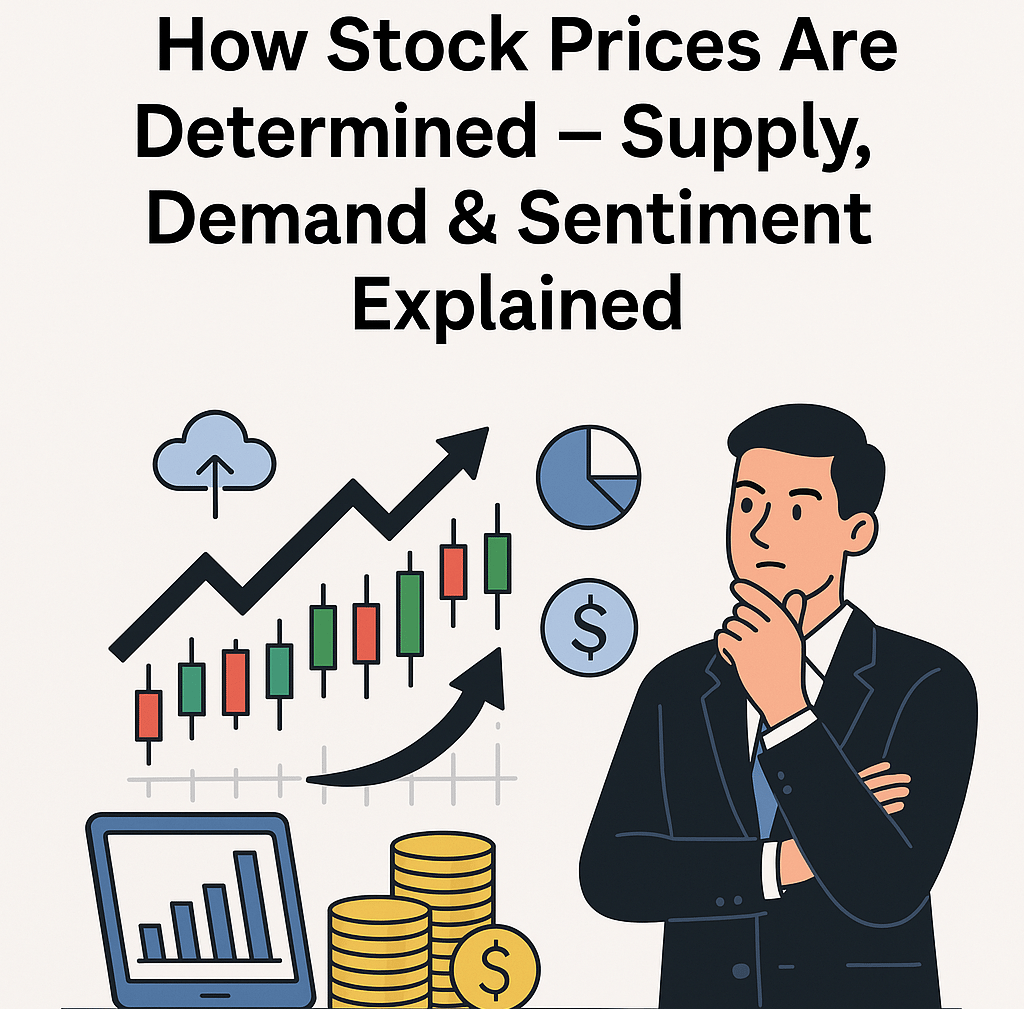How Stock Prices Are Determined – Supply, Demand & Sentiment Explained
3/31/20252 min read


How Stock Prices Are Determined – Understanding Supply, Demand & Market Sentiment
Have you ever wondered why the price of a stock rises or falls even when the company’s business hasn’t changed overnight? Stock prices are not arbitrary—they are the result of real-time interactions between buyers and sellers, influenced by a wide range of market forces.
In this blog, we break down how stock prices are determined in India, helping both new and experienced investors make better-informed decisions.
The Role of Supply and Demand
At the heart of every stock price movement lies the basic economic principle of supply and demand.
• Demand: When more investors want to buy a stock than sell it, the price goes up.
• Supply: When more investors want to sell a stock than buy it, the price goes down.
This constant tug-of-war happens on the stock exchanges like NSE and BSE, where trades are matched electronically in real time. The current price you see—also called the market price—is the last price at which a buyer and seller agreed to trade.
What Influences Investor Sentiment?
While supply and demand determine price direction, it’s investor sentiment that drives those forces. Investor sentiment is shaped by:
• Company performance (quarterly results, earnings announcements)
• Sector trends (e.g., bullishness in IT or pharma)
• Macroeconomic indicators (interest rates, inflation, GDP)
• Government policies (budget, taxation, foreign investment rules)
• Global cues (US markets, oil prices, geopolitical tensions)
• Market psychology (fear, greed, news cycles)
Even a rumor or news headline can impact prices before any fundamental change occurs. This makes it essential for investors to develop both analytical discipline and emotional control.
Market Orders vs Limit Orders – Why It Matters
The type of order you place also impacts how price discovery happens:
• A market order gets executed at the best available price
• A limit order lets you set the price you’re willing to pay or receive
When thousands of such orders are matched per second across the market, the aggregate outcome becomes the current stock price.
Who Sets the Price?
Technically, no single person or institution sets the stock price. Prices are determined dynamically through the auction mechanism of the exchange.
This is why large volumes, sudden spikes in demand, or block trades can move prices significantly—even if the company’s fundamentals remain unchanged.
Volatility and Liquidity
Highly traded stocks with strong investor interest tend to be more liquid and less volatile. On the other hand, lesser-known stocks may see larger price fluctuations due to low trading volume and wider bid-ask spreads.
That’s why many beginners are advised to start with NIFTY 50 or SENSEX stocks that are backed by strong fundamentals and have consistent market activity.
Tools to Track Price Movements
With platforms like One Solution, investors get access to:
• Real-time price charts and indicators
• Technical analysis tools
• Market depth (bid/ask spread)
• News alerts and sentiment trackers
These features allow users to not only see what’s happening but also understand why prices are moving the way they are.
Final Thoughts
Stock prices are not random—they’re a reflection of collective perception, sentiment, and data. Understanding what drives price changes helps investors time their entries better, manage risk, and make logical decisions rather than emotional ones.
Open your free Demat account with One Solution today and get access to research-backed tools, expert support, and a platform designed to help you navigate market price dynamics with clarity and confidence.
About One Solution
Quick Links
Contact Info
One Solution — Your trusted partner for financial success.
📍 F17, Grand Plaza, Paltan Bazar
Guwahati, Kamrup (M), Assam
India, Pin: 781008
📞 9650072280
© 2025 One Solution. All Rights Reserved.
